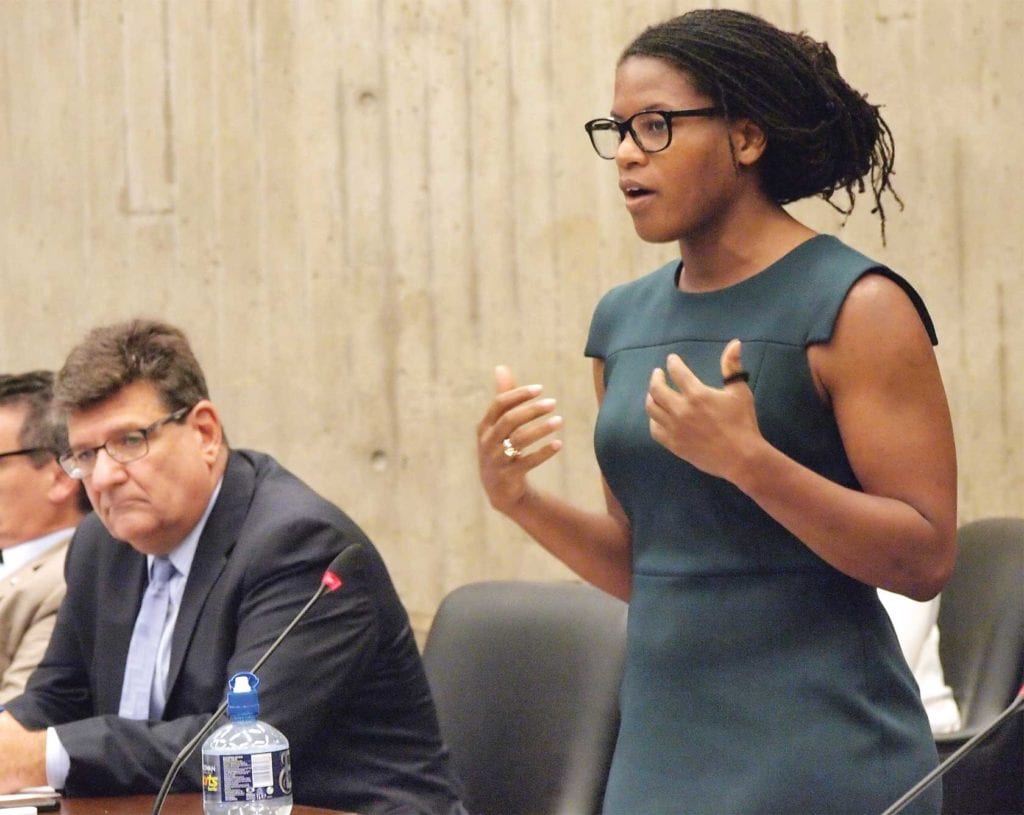Edwards calls for overhaul of ZBA
Plan would bar ZBA staff, members from participating in real estate deals

District 1 City Councilor Lydia Edwards filed an ordinance last week that would radically reform the way the Zoning Board of Appeal is constituted and conducts its business. The measure would end the practice of reserving seats on the board for real-estate industry insiders and institute strict guidelines to curb conflicts of interest.
Members of the ZBA board would be prohibited from engaging in the purchase or sale of real estate and would be barred from engaging in the business of real estate construction, development, purchase or sale within Boston for five years after the end of their term.
Speaking from the floor of the council chamber last Wednesday, Edwards said the measures would modernize the zoning board, which was created by an enabling act in 1956.
“We’re dealing with a development boom in the city of Boston,” she said. “And yet we’re going through that boom — that change of our city that’s fast and that’s intense — with a 60-year-old plan.”
In addition to ending the practice of reserving seats on the seven-member, seven-alternate-members board, Edwards’ ordinance calls for members to represent perspectives from fields including affordable housing, civil rights, environmental protection, homeowners and renters.
The ordinance would bar ZBA staff from engaging in permitting, planning, development or real estate functions in their public roles as well as in their capacity as private citizens, and require as a condition of appointment that board members refrain from doing so for up to five years after their term of service ends.
“The real estate industry should not sit on any board making regulatory decisions about real estate,” Edwards said. “Unfortunately, the unique laws that shape Boston’s board of appeal and zoning commission have set up financially-interested parties as key stakeholders. Other communities do not function like this.”
Edwards’ push to reform the troubled board comes weeks after a city employee pleaded guilty to accepting $50,000 from a developer while shepherding the developer’s project through the zoning board process. The charges brought against former Boston Planning and Development Agency employee John Lynch prompted a flood of news stories about insider dealing by zoning board members and cast a spotlight on the workings of the body, which has the power to greenlight or prohibit development when a proposal is at odds with what’s allowed under the city’s zoning code.
“The ZBA has a unique and incredible power because it grants the exceptions to the rules,” Edwards said. “We need to update those rules to make sure we don’t govern by exception.”
Edwards questioned the efficacy of the process through which developers bring projects before the ZBA, hiring politically-connected lawyers who are able to slide projects with major variances through to board approval, while homeowners seeking minor modifications to their properties without legal representation are denied.
Edwards advocates creating an office of community counsel that would provide free advice on the process of bringing cases before the ZBA.
“It shouldn’t be that hard to petition your government, that every time you go in front them you need legal counsel,” she said. “The government should have a neutral counsel.”
Aiming for transparency
Under Edwards’ ordinance, the ZBA would be required to post quarterly reports of the number and type of conditional use permits and variances granted by neighborhood and zoning area. Edwards said the data would enable people to see “which neighborhoods are being developed by the exceptions to the rules and which ones are being developed by the rules, and which ones are actually having to follow the rules.”
She added, “That information shouldn’t just be us talking to each other after a hearing. And it should be regular.”
Additionally, records of ZBA votes would be made available electronically and in paper at City Hall and 1010 Massachusetts Ave. no later than seven days following a hearing. Notices of hearings would be posted electronically 20 days in advance.
Edwards would also require property owners seeking reuse of an occupied building to submit plans to mitigate displacement and to disclose information about recent or planned evictions.
“We are dealing with a displacement crisis and our city is trying to prevent displacement,” she said.
The ordinance would direct the ZBA to consider whether the granting of a variance would affect the city’s goals for income-restricted housing, further fair housing goals, prevent displacement and address climate change, in addition to whether it is consistent with neighborhood planning.
While no councilor spoke in favor of or against Edwards’ proposal, all signed on to the order for a hearing on the ordinance.
Wu: Dismantle the BPDA
Meanwhile, at-large Councilor Michelle Wu released a 67-page policy paper Monday outlining the case for dismantling the Boston Planning and Development Agency, citing a lack of public accountability and transparency at the public agency, which derives its funding from the lease and sale of publicly-owned land in Boston.
In her report, Wu says the agency is contributing to the rising cost of housing in Boston, despite the increased construction of new units in the city.
“Instead of delivering the resources to address our most urgent challenges, Boston’s development process is making our problems worse,” she writes.
Wu advocates transferring the agency’s assets to city control to deprive the agency of its funding.
“By returning the property holdings from which the BPDA derives its operating budget to City ownership, and migrating the BPDA’s functions back under City Council oversight, we can effectively dismantle this unaccountable super-agency,” she explains.
In past years, the BPDA, formerly known as the Boston Redevelopment Authority, has come under fire from critics for handling both planning and development functions for the city, a mix of responsibilities many say tips the scales in favor of real estate developers and against the interests of residents in whose neighborhoods development is occurring.
The release of Wu’s report, days after she dominated the field of at-large council candidates in the preliminary election, comes amid speculation that she’s planning a run for mayor. Her call to dismantle the agency echoes similar pledges from past mayoral candidates.







